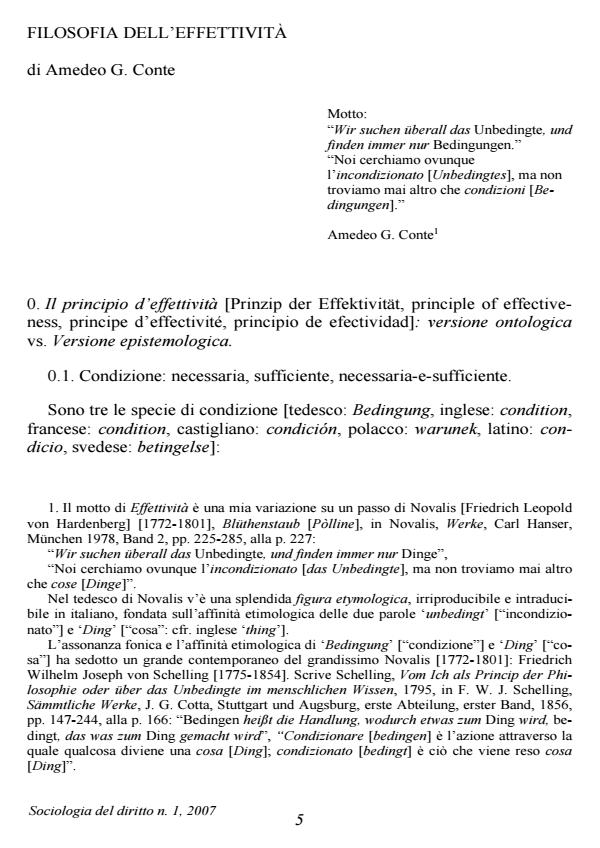Filosofia dell'effettività
Journal title SOCIOLOGIA DEL DIRITTO
Author/s Amedeo G. Conte
Publishing Year 2007 Issue 2007/1
Language Italian Pages 8 P. 5-12 File size 183 KB
DOI
DOI is like a bar code for intellectual property: to have more infomation
click here
Below, you can see the article first page
If you want to buy this article in PDF format, you can do it, following the instructions to buy download credits

FrancoAngeli is member of Publishers International Linking Association, Inc (PILA), a not-for-profit association which run the CrossRef service enabling links to and from online scholarly content.
Amedeo G. Conte’s paper Philosophy of Effectiveness deals with the philosophical import of the principle of effectiveness. It consists of three parts: Two paradoxes of the principle of effectiveness. Two interpretations of the principle of effectiveness. The epistemological rôle of the principle of effectiveness.Pasquale Stanzione, Parent-children Relations as Interpreted by the Italian Constitutional Court Despite the common attitude that denies the autonomous attribution of human dignity and development of the personality to offspring, a minor is a person on a par with an adult. The relationship established between parents and their children has been described intentionally by the Italian Constitutional Court (e.g. in its decision N° 11 of 1981) as a bond whose purpose is to guarantee the latter individualising and continuous affection, settings that are not precarious and situations that are not conflictual. The interests of minors are not discussed in general, abstract terms except to avoid enshrining a negative interpretation of certain facets of Arts. 330 and 333 of the Civil Code while the essential lines of more than one question of legitimacy are investigated. In this respect, the Constitutional Court has made a singularly flexible interpretation of the wording used in the Code, demonstrating an open mind about rectifying its own previous positions by amending them to suit a changed context, as in its decisions N° 112 of 1997, N° 158 of 1991 and, again, N° 347 of 1998. Evidence of this evolution can also be glimpsed in the intentional change of linguistic formulae and expressions used: suffice to compare the decision N° 347 with previous ones in the same field. A closer look reveals that this is a gradual (and sometimes at least partly unconscious) process of emergence of the topic of the relationship in the definition of the bond between parents and their offspring. The precise form taken by this relationship is that of a connection between complex subjective legal situations, which goes further than the dynamics of upbringing, evolving and altering as the minor’s requirements change in the course of growing older. Less and less tacit, in the background, is the consideration of the minor’s discretionary ability.
Amedeo G. Conte, Filosofia dell'effettività in "SOCIOLOGIA DEL DIRITTO " 1/2007, pp 5-12, DOI: